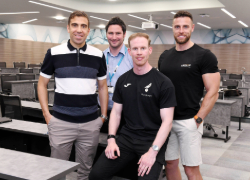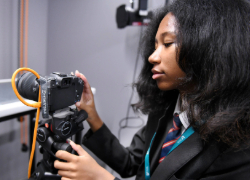Funding to help those with specific learning needs
A Teesside academic has been awarded a £12,000 research grant from the Royal Society to examine ways to support people with specific learning needs.
Dr Steve Green, Director for Undergraduate Programmes in the School of Computing, will work alongside former Teesside student Dr Lilyana Nacheva-Skopalik, from the Technical University of Gabrova in Bulgaria, on the two year project.
The pair will examine the use of assessment tools to help aid the learning process for adult students with specific learning needs – such as the blind, the deaf and people with dyslexia.
They will look at developing an e-assessment tool for personalised e-learning which will assess students’ knowledge and understanding regardless of disability or accessibility needs.
The project, titled Intelligent e-Assessment for an Adaptable Personal Learning Environment, is being funded by the Royal Society, one of the world's oldest scientific academies which aims to expand knowledge by championing the development and use of science.
Dr Green said that current learning environments make it difficult to meet the needs of all learners but, with increased use of the internet and assistive technologies for people with disabilities, a concept of ‘inclusive design’ is more practical.
Encouraging higher levels of performance He added: ‘Web pages are largely composed of text and images - if the images have been tagged with alternative text then specialist screen-reader software can describe the page to a blind user.
‘Using a video camera and speech recognition software, a lesson can be recorded and transcribed in such a way as to make it accessible to a deaf user. A student who has dyslexia may benefit from a portable electronic dictionary, or an application on a mobile phone.
‘By using electronic forms of assessment and an intelligent system, it is increasingly possible that adaptations can be applied which will allow students of all abilities to demonstrate higher levels of performance or make better use of feedback.’
The international joint project will see Dr Green work collaboratively with Dr Nacheva-Skopalik and her colleagues in Bulgaria. Dr Nacheva-Skopalik, who completed her PhD at Teesside in 2007, will also make extended visits to Teesside University over the next two years.
The project is not necessarily about developing learning materials, but more specifically examining the needs and preferences of learners, as individuals or groups. It will also provide vital information to teachers to equip them with the tools to provide more positive feedback.
Dr Green is hopeful the research will lead to further development opportunities and potential funding streams for what he sees as a vital part of the learning process.
He added: ‘e-assessment is very important for learning in terms of supporting users and giving feedback. We are looking at very personalised learning to cater for the needs of specific individuals.’
 Teesside University awards Honorary Doctorates to industry
...
Teesside University awards Honorary Doctorates to industry
... Alumni support elite football event
Alumni support elite football event Girls explore digital careers at state-of-the-art new
...
Girls explore digital careers at state-of-the-art new
...